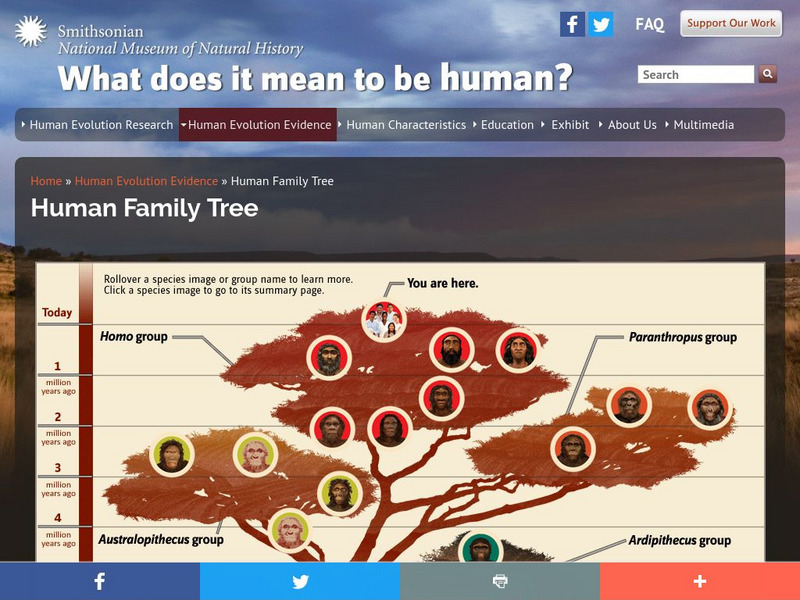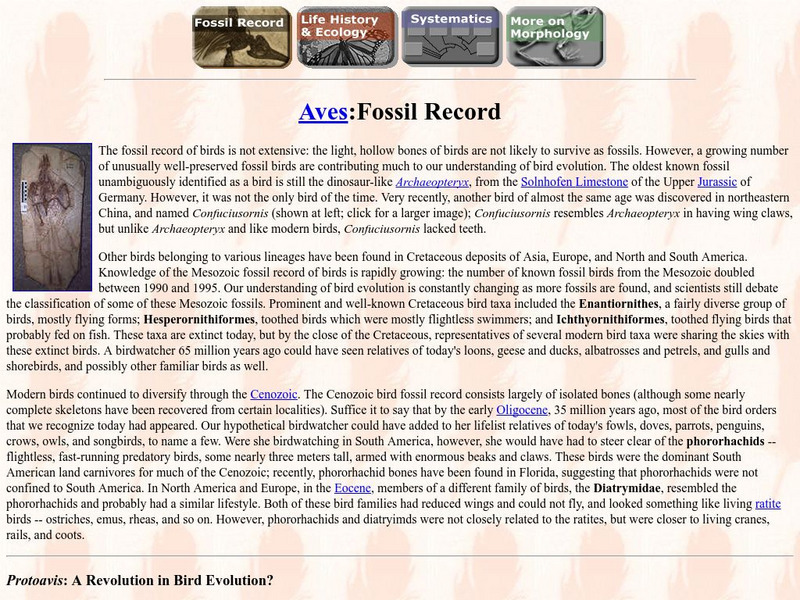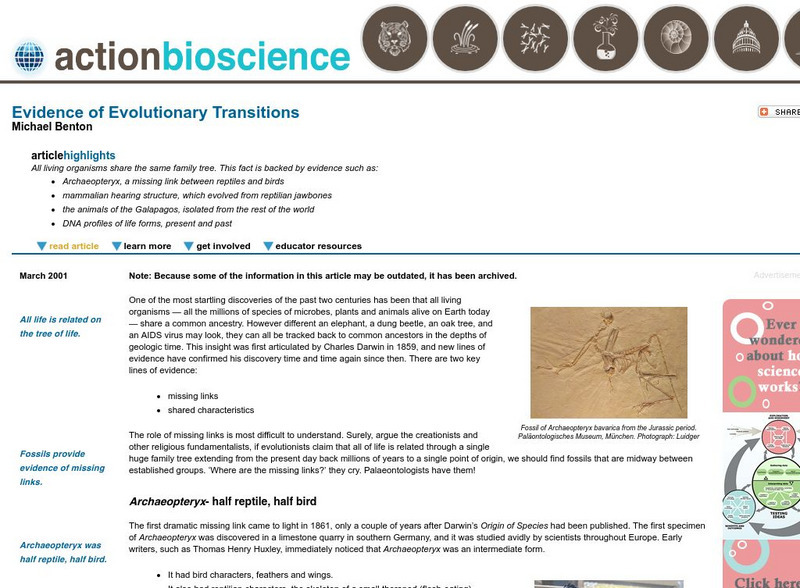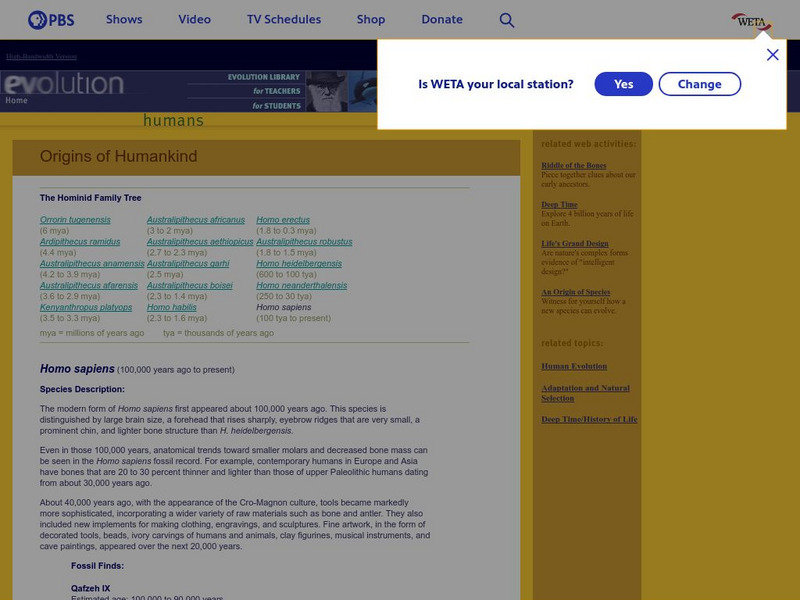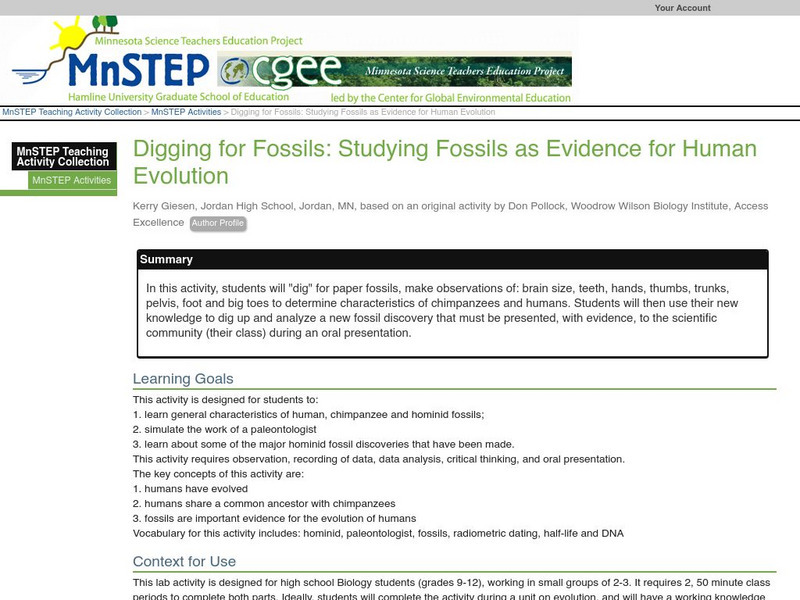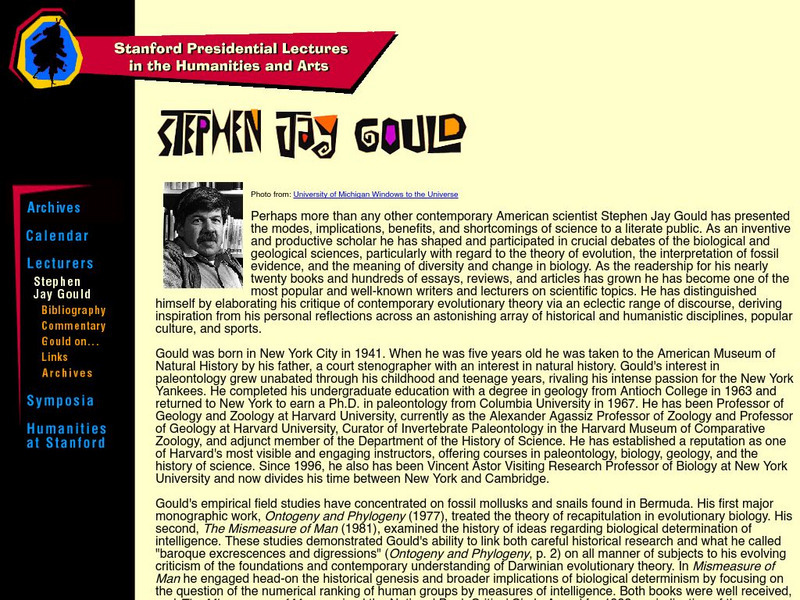Hi, what do you want to do?
Georgia Department of Education
Ga Virtual Learning: Biology: Evolution
Through informational text, online lab activities, virtual simulations, and video clips, students study the concepts of biological evolution.
Howard Hughes Medical Institute
Hhmi: Bio Interactive: Stickleback Evolution Virtual Lab
This virtual lab uses stickleback fish and fossil specimens to study evolutionary processes and teaches students skills of data collection and analysis.
Smithsonian Institution
National Museum of Natural History: Human Origins: Human Family Tree
Find the human ancestor you are interested in and click on it either in the timeline or the list below for more details. Each fossil or reconstruction pictured includes links to more details about it.
CPALMS
Florida State University Cpalms: Florida Students: Evolution: Examining the Evidence
Strengthen understanding of how different types of scientific evidence support the theory of evolution, including direct observation, fossils, DNA, biogeography, and comparative anatomy and embryology.
University of California
Ucmp: Aves: Fossil Record
A very good article on the fossil evidence and the prominent theory on the evolution of birds. Addresses both sides and presents information. Predominently agrees with the pro-dinosaurian point of view.
Smithsonian Institution
National Museum of Natural History: Paleobiology: Geologic Time: The Oligocene
Travel through Earth's history to learn about the Oligocene time period, which is characterized by the appearance of most of the living families of mammals.
University of California
Ucmp: Learning From the Fossil Record
Fossils provide scientists with clues about Earth's past. This site from the University of California's Museum of Paleontology is great for exploring lots of information on fossils.
CK-12 Foundation
Ck 12: Biology: Fossils
[Free Registration/Login may be required to access all resource tools.] Describes how fossils help us understand the past.
Indiana University
Ensi: The Great Fossil Find Lesson Plan
Students hear a story as they "find" bones that you have put in an envelope for them. Their job is to begin assembling the bones as best they can. The students will invariably come up with different configurations--just like scientists...
American Institute of Biological Sciences
Action Bioscience: Evidence of Evolutionary Transitions
Charles Darwin's theory that all living organisms are connected in some way has been confirmed through intense studies over centuries. Understand the similarities that bond all things living to the same family tree by checking out this...
Open Curriculum
Open Curriculum: Studying the History of Life
This in-depth article illustrates the concept of geologic time, and helps the learner understand why fossils are rare.
John Wiley & Sons
Wiley: Earth Through Time: Life of the Paleozoic: Phylum Chordata
Learn about the evolution of life in the Paleozoic Era based on fossil evidence of the five classes of fishes. Read about the role these chordates played in the evolution of tetrapods.
Smithsonian Institution
National Museum of Natural History: Homo Habilis
This resource provides graphics, as well as explanation, of the remains of Homo habilis.
PBS
Pbs Learning Media: Tetrapod Limbs
This illustration from Evolution by Monroe W. Strickberger shows the remarkable similarities between the bones in the forelimbs of various tetrapods, all of whose limbs serve very different functions.
Other
Bio Web Evolution: Homepage
This site from BioWeb Evolution was originally created as a ThinkQuest entry, and it has some good basic information about evolution. This page is on fossils and geologic time.
Other
Utct Digi Morph: Digital Morphology the University of Texas
A dynamic archive of information on digital morphology and high-resolution X-ray computed tomography of biological specimens.
University of California
Ucmp: The Evolution of Flight in Birds
Evidence from the fossil record is used to support bird evolution from small carnivorous dinosaurs. In the student module, feathers, behavior, and skeletal structure are examined in an interactive lesson designed to impart a complete...
PBS
Pbs: Evolution: Origins of Humankind: Homo Sapiens
Read a description of Homo sapiens as a species, learn about the variety of Homo sapiens fossils that have been found, and discover evidence of the culture of these early people.
PBS
Pbs Learning Media: Fossils in the Gobi
Biologist Mike Novacek discusses his discovery of mammal fossils in the Gobi Desert and tells us what we can learn from them. From an episode about extinction broadcast on the PBS series "Evolution."
PBS
Pbs Learning Media: Early Tetrapod Fossils
In this transcript of an interview filmed for the PBS series "Evolution," scientists Ted Daeschler and Neil Shubin describe the discovery and significance of some of their key fossil finds.
Science Education Resource Center at Carleton College
Serc: Digging for Fossils: Studying Fossils as Evidence for Human Evolution
As students dig for paper fossils, they make observations of brain size, teeth, hands, thumbs, trunks, pelvis, foot and big toes to determine characteristics of chimpanzees and humans. Then, they dig up and analyze a new fossil...
PBS
Pbs Learning Media: Whales in the Making
This graphic from Evolution, traces the evolution of whales from land-dwelling mammals to the aquatic creatures we know today. A PDF is included that diagrams the evolutionary process that is believed to have taken place.
Stanford University
Stanford Presidential Lectures: Stephen Jay Gould
Standford University provides interesting biographical and professional information on Stephen Jay Gould and his many contributions to scientific thought, including his efforts to help people see science "As something that is important...
Other
Exploring Origins Project: Exploring Life's Origins
Explore life's evolutionary history on the planet through molecular illustrations and animations. Pictorial evidence is based on origin of life research and theory.







